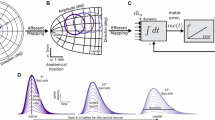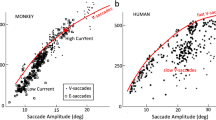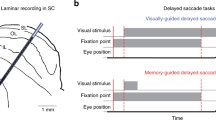Abstract
A model of the saccadic system of salamanders on the basis of electrophysiological and anatomical results is presented. The model includes centers found to be significant for the guidance of saccades in these comparatively simple vertebrates. In particular, these are the optic tectum, the bulbar reticular formation and the motor system. The latter consists of two pairs of neck-muscles, an epaxial and a hypaxial one driven by their respective motoneurons. The model includes a visual, a sensori-motor, and a motor level. At the sensory level, the retinal coordinates are transferred to the optic tectum to establish an orthogonal map of visual angles. A secondary visual map of the ipsilateral eye with a pointsymmetrical organization exists in addition. The premotor system of the tectum was modelled according to an ensemble-coding principle. Thus, local activation of the visual map results in recruitment of an appropriate number of tectal premotor units. Simulation of the model reproduces correct metric properties of salamander saccades under varying stimulus presentations.
Similar content being viewed by others
References
An der Heiden U, Roth G (1987) Mathematical model and simulation of retina and tectum opticum of lower vertebrates. Acta Biotheor 36:179–212
Ewert J-P (1967) Aktivierung der Verhaltensfolge beim Beutefang der Erdkröte Bufo bufo L. durch elektrische Mittelhirnreizung. Z Vergl Physiol 54:455–481
Ewert J-P (1970) Neural mechanism of prey-catching and avoidance behavior in the toad Bufo bufo L.. Brain Behav Evol 3:36–56
Ewert J-P (1984) Tectal mechanisms that underlie prey-catching and avoidance behaviors in toads. In: Vanegas H (eds) Comparative neurology of the optic tectum. Plenum Press, New York, pp 247–416
Finkenstädt T, Ewert J-P (1983) Processing of area dimensions of visual key stimuli by tectal neurons in Salamandra salamandra. J. Comp Physiol 153:85–98
Finkenstädt T, Ebbesson SOE, Ewert J-P (1983) Projections to the midbrain tectum in Salamandra salamandra L. Cell Tiss Res 234:39–55
Fox B, Manteuffel G (1992) Tectal cells sensitive for motion parallax in a salamander. In: Eisner N, Richter DW (eds) Rhythmogenesis in neurons and networks, Thieme, Stuttgart, p 363
Francis ETB (1934) The anatomy of the salamander. Oxford at the Clarendon Press, England
Gaillard F, Garcia R, Roussel H (1988) First neurophysiological approach to the retino-tectal projections in Discoglossus pictus (Anura). J Comp Physiol 162:435–441
Gaze RM, Jacobson M (1962) The projection of the binocular visual field on the optic tecta of the frog. Q J Exp Physiol Cogn Med Sci 47:273–280
Grüsser O-J, Grüsser-Cornehls U (1968) Neurophysiologische Grundlagen visueller angeborener Auslösemechanismen beim Frosch. Z Vergl Physiol 59: 1–24
Harris WA (1980) The effects of eliminating impulse activity on the development of the retino-tectal projections in salamanders. J Comp Neurol 194:303–317
Herrick CJ (1948) The brain of the tiger salamander Ambystoma tigrinum. Univ Chicago Press, Chicago
Himstedt W (1967) Experimentelle Analyse der optischen Sinnesleistungen im Beutefangverhalten der einheimischen Urodelen. Zool Jb Physiol 73:281–320
Himstedt W (1969) Zur Funktion eines Reizfiltermechanismus im visuellen System der Urodelen. Z Vergl Physiol 62:197–204
Himstedt W, Fischerleitner E (1975) Die Antworten von Retinaneuronen auf Farbreize bei Urodelen. Zool Jahrb Physiol 79:128–147
Himstedt W, Tempel P, Weiler J (1978) Responses of salamanders to stationary visual patterns. J. Comp Physiol 124:49–52
Himstedt W, Heller K, Manteuffel G (1987) Neuronal responses to moving visual stimuli in different thalamic and midbrain centers of Salamandra salamandra L. Zool Jb Physiol 91:243–256
Ingle D (1968) Visual releasers of prey-catching behavior in frogs and toads. Brain Behav Evol 1:500–518
Jordan M, Matsushima T, Roth G (1990) Does the toad's tectum have a motor map? In: Elsner N, Roth G (eds) Brain, perception, cognition. Thieme, Stuttgart, p 86
Kostyk SK, Grobstein P (1982) Visual orienting deficits in frogs with various unilateral lesions. Behav Brain Res 6:379–388
Kostyk SK, Grobstein P (1987) Neuronal organization underlying visually elicited prey orienting in the frog. III. Evidence for the existence of an uncrossed descending tectofugal parthway. Neuroscience 21:83–96
Mallot HA, Seelen W von (1989) Why cortices? Neural networks for visual information processing. In: Ewert J-P, Arbib MA (eds) Visuomotor coordination. Plenum Press, New York, pp 357–382
Manteuffel G (1984) A “physiological” model for the salamander horizontal optokinetic reflex. Brain Behav Evol 25:197–205
Manteuffel G (1989) Compensation of visual background motion in salamanders. In: Ewert J-P, Arbib MA (eds) Visuomotor coordination. Plenum Press, New York, pp 311–340
Manteuffel G (1991) A biological visuo-motor system: how dissimilar maps interact to produce behavior. In: Meyer J-A, Wilson SW (eds) Proc First Intern Conf on Simulation of Adaptive Behavior: From Animals to Animats, MIT-Press, Cambridge, pp 120–126
Manteuffel G (1992) Control of gaze in salamanders. In: Berthoz A, Vidal PP, Graf W (eds) The head-neck sensory motor system. Oxford University Press, New York, pp 85–90
Manteuffel G, Fox B, Roth G (1989) Topographic relationships of ipsiand contralateral visual inputs to the rostral tectum opticum in the salamander Plethodon jordani indicate the presence of a horopter. Neurosci Lett 107:105–109
Manteuffel G, Naujoks-Manteuffel C (1990) Anatomical connections and electrophysiological properties of toral and dorsal tegmental neurons in the terrestrial urodele Salamandra salamandra. J Hirnforsch 31:65–76
McIlwain JT (1982) Lateral spread of neural excitation during microstimulation in intermediate gray layer of cat's superior colliculus. J Neurophysiol 47:167–178
Naujoks-Manteuffel C, Manteuffel G (1988) The origins of descending projections to the medulla oblongata and rostral medulla spinalis in the urodele Salamandra salamandra (Amphibia). J Comp Neurol 273:187–206
Naujoks-Manteuffel C, Manteuffel G (1990) Quantitative distribution of descending tectal efferent cells in salamanders. Neurosci Lett 118:103–106
Robinson DA (1972) Eye movements evoked by collicular stimulation in the alert monkey. Vis Res 12:1795–1808
Robinson DA (1986) Is the oculomotor system a cartoon of motor ontrol? In: Freund HJ, Cohen B, North J (eds) Progress in brain research, vol 64. Elsevier, Amsterdam, pp 411–417
Roth G (1976) Experimental analysis of the prey catching behavior of Hydromantes italicus Dunn (Amphibia, Plethodontidae). J Comp Physiol 109:47–58
Roth G (1982) Responses in the optic tectum of the salamander Hydromantes italicus to moving prey stimuli. Exp Brain Res 45:386–392
Roth G (1987) Visual behavior in salamanders. Studies of brain function, vol 14. Springer, Berlin Heidelberg New York
Roth G, Naujoks-Manteuffel C, Grunwald W (1990) Cytoarchitecture of the tectum mesencephali in salamanders: a Golgi and HRP study. J Comp Neurol 291:27–42
Seelen W von, Mallot HA, Giannakopoulos F (1987) Characteristics of neuronal systems in the visual cortex. Biol Cybern 56:37–49
Sparks DL (1986) Translation of sensory signals into commands for control of saccadic eye movements: role of primate superior colliculus. Physiol Rev 66:118–171
Stuermer CAO (1988) Retinotopic organization of the developing retinotectal projection in the zebrafish embryo. J Neurosci 8:4513–4530
Van Gisbergen JAM, Van Opstal AJ, Tax AAM (1987) Collicular ensemble coding of saccades based on vector summation. Neuroscience 21:541–555
Van Opstal AJ, Van Gisbergen JAM (1989a) A nonlinear model for collicular spatial interactions underlying the metrical properties of electrically elicited saccades. Biol Cybern 60:171–183
Van Opstal AJ, Van Gisbergen JAM (1989b) A model for collicular efferent mechanisms underlying the generation of saccades. Brain Behav Evol 33:90–94
Werner C, Himstedt W (1985) Mechanism of head orientation during prey capture in salamander Salamandra salamandra L.. Zool Jb Physiol 89:359–368
Wiggers W (1991) Elektrophysiologische, neuroanatomische und verhaltensphysiologische Untersuchungen zur visuellen Verhaltenssteuerung bei lungenlosen Salamandern. Doctoral thesis, Universität Bremen
Author information
Authors and Affiliations
Rights and permissions
About this article
Cite this article
Manteuffel, G., Roth, G. A model of the saccadic sensorimotor system of salamanders. Biol. Cybern. 68, 431–440 (1993). https://doi.org/10.1007/BF00198775
Received:
Accepted:
Issue Date:
DOI: https://doi.org/10.1007/BF00198775




